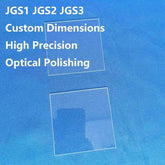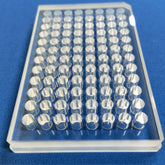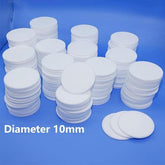Do sapphire glass lenses provide effective protection against blue light damage?
Sapphire glass lenses are a specific type of optical eyewear lens designed to mitigate the adverse effects of prolonged exposure to blue light. Blue light is defined as a specific wavelength of light situated between ultraviolet and visible light. Sources of blue light include natural sunlight, electronic devices (such as computer monitors, smartphones, and tablets), as well as artificial lighting systems. In recent years, the proliferation of electronic devices and the corresponding increase in screen time have raised significant concerns regarding the impact of blue light, particularly its potential detrimental effects on ocular health.

It is believed that the consequences associated with blue light exposure may encompass symptoms such as eye strain, visual discomfort, reduced visual acuity, impaired sleep quality, and possible long-term risks for many ocular diseases like macular degeneration. These issues have led to heightened interest in blue-light-filtering glasses aimed at alleviating the negative impacts of blue light on eye health.
Sapphire glass lenses are claimed to resist the damaging effects of blue light due to the incorporation of specific optical coatings during the manufacturing process. These optical coatings are designed to reflect and absorb blue light wavelengths, thereby reducing the amount of blue light entering the eye and consequently reducing the potential damage to the eye. Nevertheless, there is no consensus among scientists as to the efficacy of sapphire glass lenses in protecting against blue light damage.

Some studies have indicated that blue light may exert an influence on the eyes. It has been demonstrated that the prolonged use of electronic devices and prolonged exposure to blue light can result in the development of eye strain, dryness and impaired vision. Such symptoms are collectively referred to as computer vision syndrome (CVS). Nevertheless, the evidence is inconclusive as to whether blue light directly causes more serious eye problems, such as macular degeneration.
In addition, the effectiveness of sapphire glass lenses is also controversial. Some studies have indicated that blue light filters may reduce the level of eye strain and visual discomfort. However, there is currently no clear evidence that they can prevent or treat any eye disease, and also, available evidence does not support the assertion that blue light filter lenses are effective in preventing or treating eye problems.

Despite the absence of a consensus within the scientific community regarding the efficacy of blue light filtering lenses, their potential benefits for certain individuals remain a possibility. For instance, individuals who frequently utilize electronic devices or necessitate sustained concentration for work may derive benefits from the use of blue-light filtering glasses. Furthermore, individuals who have been diagnosed with ocular conditions or are at an elevated risk for developing ocular diseases may also mitigate the likelihood of additional ocular damage by utilizing blue light-filtering lenses.
In conclusion, while sapphire glass lenses purport to offer protection against blue light damage, the scientific community remains divided regarding their efficacy. Although certain studies indicate that blue light may have an impact on ocular health, there is currently no definitive scientific evidence substantiating the claim that blue light filtering lenses can prevent or treat eye diseases. Nevertheless, individuals who engage in prolonged use of electronic devices or those with pre-existing ocular conditions may still derive some benefits from utilizing blue light filtering lenses. Most importantly, adopting moderate visual habits and implementing proper eye care practices represent the most effective strategies for preventing ocular issues.






